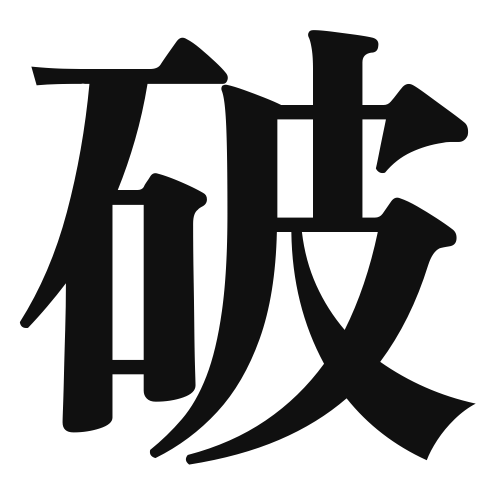1. Overview of Meaning
The kanji “破” (ha) means “to break,” “to destroy,” or “to tear.” It conveys the idea of something being damaged or disrupted, often implying a sense of loss or failure.
2. Formation and Radical
Formation of the Kanji: The kanji “破” is a compound character that combines elements to convey its meaning. It is formed from the radical “石” (ishi), meaning “stone,” which suggests something solid being broken, and the phonetic component “巴” (ha), which contributes to its pronunciation.
Radical: The radical of “破” is “石,” indicating its connection to hard materials and the act of breaking them.
3. Examples of Usage
Common Words and Phrases: Some frequently used words that include “破” are:
- 破壊 (はかい, hakai) – destruction
- 破産 (はさん, hasan) – bankruptcy
- 破れる (やぶれる, yabureru) – to be torn or broken
Example Sentences in Daily Conversation:
- このおもちゃは簡単に破れる。 (Kono omocha wa kantan ni yabureru.) – This toy breaks easily.
- 彼は破産してしまった。 (Kare wa hasan shite shimatta.) – He went bankrupt.
4. Synonyms and Antonyms
Similar Kanji: A similar kanji is “壊” (こわす, kowasu), which also means “to break” but often refers to breaking something intentionally or through use.
Opposite Kanji: An antonym is “修” (しゅう, shuu), which means “to repair” or “to fix,” indicating the act of restoring something rather than breaking it.
5. Cultural and Historical Background
Connection to Japanese Culture: The concept of “破” is significant in Japanese culture, often associated with the impermanence of things, a theme prevalent in traditional arts and literature.
Proverbs and Idioms: One common saying is “破れ鍋に綴じ蓋” (yabure nabe ni toji bita), which translates to “a broken pot has a lid that fits,” meaning that everyone has their match or that there is someone for everyone, even if they seem imperfect.
